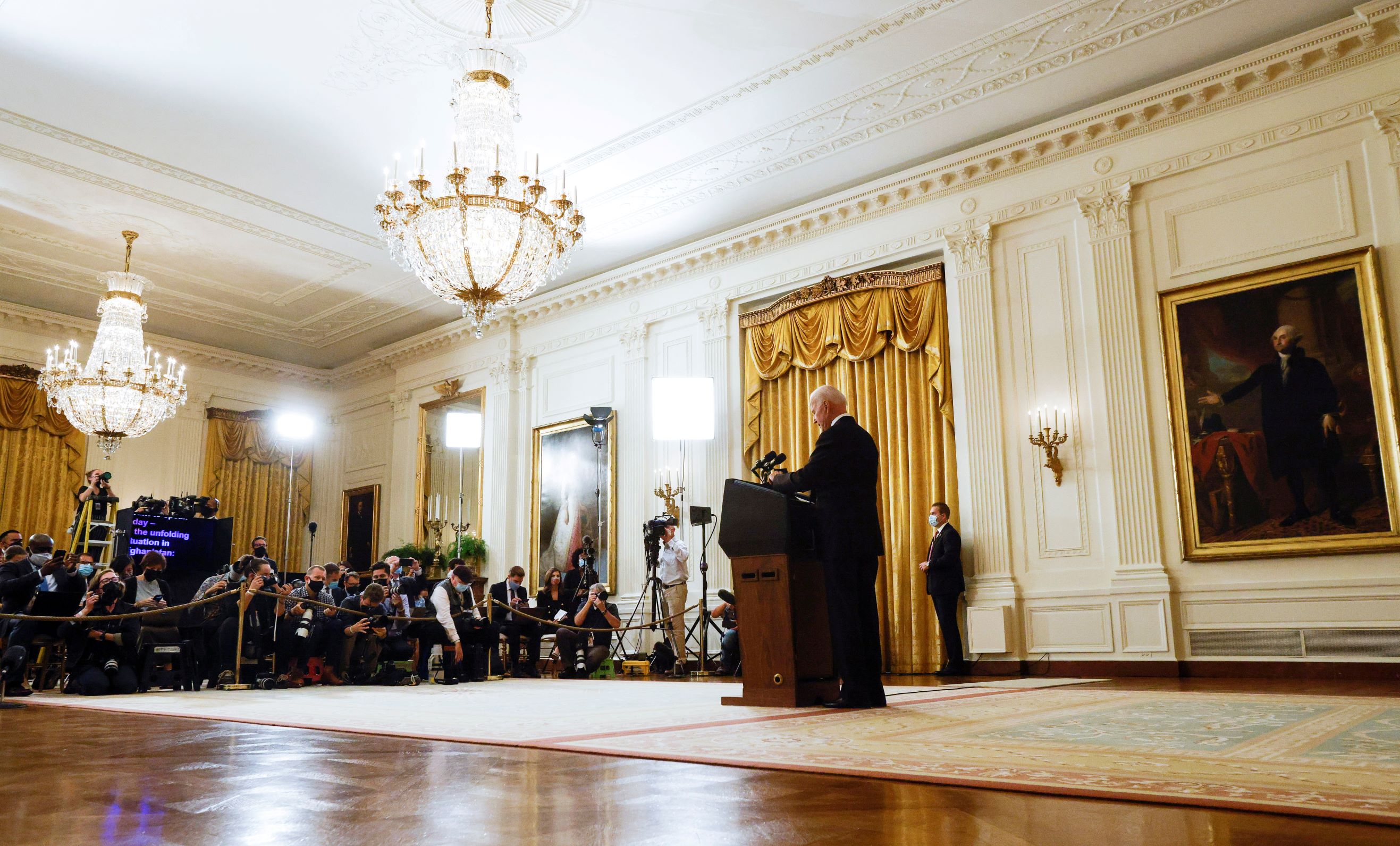The Fall of Afghanistan: The Biden Administration's First Crisis
 Photo: JOSHUA ROBERTS/Reuters/Forum
Photo: JOSHUA ROBERTS/Reuters/Forum
The withdrawals from the “endless wars” in Afghanistan and Iraq are among the few elements of U.S. foreign policy that have consistently caught the attention of voters. This is because of the wars’ strong ties to domestic politics, including many billions of dollars spent on the armed forces and helping veterans when the return home. The exhaustion of the public with so many years of involvement in both countries was the main factor motivating the Trump administration to reach an agreement with the Taliban in 2020. For the same political reason, Biden stuck with it and, contrary to the recommendations of the armed forces and intelligence services, completely ended the military presence in Afghanistan while maintaining a diplomatic presence. The takeover of power in Afghanistan by the Taliban on 15 August forced the U.S. to evacuate certain civilians, with more than 122,000 people flown out of Kabul airport over 16 days. During the evacuation, however, a terrorist attack by ISIS-K killed at least 180 people, including 13 U.S. soldiers, and wounded about 150. When the evacuation ended on 30 August, not all the Americans in the country or all the Afghans who had cooperated with the U.S. were able to make it out.
The withdrawal of troops and the chaotic evacuation led to strong criticism of the Biden administration from politicians in both major political parties and experts. The president and his team were accused of misdiagnosing the situation in Afghanistan, failing to consult with allies at the initial stage of the evacuation from Kabul, and even of wasting 20 years of effort to combat the sources of international terrorism. The State and Defense departments launched internal investigations into the Afghanistan withdrawal. Given a lack of prospects for the continuation of peace talks, the special envoy for Afghanistan in both the Trump and Biden administrations and the chief architect of the agreement with the Taliban, Zalmay Khalilzad, resigned.
Assessment of the Biden Administration’s Actions. In polls following the ISIS-K attack on Kabul airport, overall support for the president was 43%, down from 49% in early August, the lowest during his term. Only 38% of respondents supported Biden’s approach to Afghanistan, with 84% agreeing that U.S. troops should remain in Afghanistan until the last U.S. citizens were withdrawn, and 71% that the U.S. military should have remained until the evacuation of the last Afghan associates. At the same time, only 7% replied that the military presence in Afghanistan reduced the terrorist threat to the U.S. This demonstrates that the Americans were not opposed to the total withdrawal of troops from Afghanistan (as other polls also showed in recent years) just Biden’s chaotic pull-out.
Impact on Relations with Congress
The crisis has put the Biden administration’s relationship with Congress to the test, even though his own party, the Democrats, control both chambers. As in the case of lifting some of the sanctions on Nord Stream 2, the chairs of the House and Senate foreign affairs committees criticised the actions of the administration and demanded explanations from it. Separate hearings were also held before the respective armed forces and intelligence committees. Among those summoned were Secretary of State Antony Blinken, Secretary of Defense Lloyd Austin, the Chairman of the Joint Chiefs of Staff Gen. Mark Milley, and U.S CENTCOM Commander Gen. Kenneth McKenzie. During the public part of the hearings, the military commanders revealed that they recommended to Biden that the U.S. keep 2,500 troops in Afghanistan. They were to deter the Taliban from trying to seize power in the country, as well as to ensure the security of American diplomats. Biden, asked earlier by media, stated that he did not remember such recommendations, which rather confirms that the president ignored the warnings from the very start of his term of office.
While the first phase of the congressional response focused on the mistakes made by the Biden administration, Democrats will seek to explore a broader spectrum of policy decisions, covering at least the entire Trump term and possibly going back to the Obama and George W. Bush administrations. By showing the systemic approach to Afghanistan had been incorrect from the beginning, resulting in a lack of realistic policy goals towards Afghanistan, the Democrats aim to justify Biden’s withdrawal of troops. At the same time, they will try to distance themselves from the way foreign policy is being conducted by the administration, particularly the lack of consultations with allies and ignoring warnings from experts. Democratic politicians present assessments similar to those of the majority of the population: in their opinion, the unforeseen total takeover of power by the Taliban so quickly, the chaotic evacuation, and the failure to get all Americans and Afghans who cooperated with U.S. forces out in time must be explored and explained. The decision to withdraw troops completely from Afghanistan, however, is still considered correct. However, the Afghan crisis is undermining the general trust of congressional Democrats in Biden and his administration in the field of foreign policy, which, combined with the difficulties in convincing every one of the party’s members in the Senate to support the proposed economic and social reforms (which are more important than foreign policy issues come election time), limits the president’s room for political dealing. This in turn makes it more difficult for the Biden administration to showcase clear successes, which could jeopardise the Democrats in the November 2022 mid-term congressional elections, risking their majorities in both chambers of Congress. A Republican takeover of one of them, but especially the Senate, would handicap Biden for the second half of his term. To minimise this risk, in the near future, the Democrats will likely compromise on various legislative reforms, which if adopted should result in an improvement in the ratings of the president and the party.
Republican Strategy
The hearings initiated by the congressional committees will be the primary platform for the Republicans to build a message about the incompetence of the Biden administration and Democrats in the field of foreign policy and portray it as undermining the confidence of other countries in the U.S. and weakening the U.S. position as the leader of the international community. They will seek to limit the scope of the hearings to the Biden administration only (so, not any of his Republican predecessors), trying to demonstrate its ineffectiveness in managing the crisis. For the Republicans, it is key to extend this charge to the whole Democratic Party to weaken it ahead of the 2022 congressional elections. Their goal will be to demonstrate the general incompetence of the Democrats to conduct foreign policy (citing Gen. Milley’s testimony and that Biden ignored the warnings) or to exercise executive, based on the criticism of the Biden administration’s domestic politics. In this way, the Republicans will campaign on the need for them to take control of Congress to increase the legislative oversight of the executive.
Conclusions
The crisis in Afghanistan will continue to garner Congress’ attention but it will not result in the resignation of key members of the administration. It also will not be completely forgotten by the public, but for most Americans it is more important that the U.S. is no longer embroiled in that “never-ending war”. This alone could improve the Democrats’ chances of at least maintaining control of Congress if not a win in some scenarios, but especially if Biden can ensure that his flagship initiatives in the sphere of the economy, climate protection, and fighting the COVID-19 pandemic start to bring tangible results.
Afghanistan may reappear on the agenda as the situation there worsens or if the threat to the U.S. from terrorist groups active in Afghanistan increases. For the Republicans, Afghanistan will be a hot topic in the electoral context, underpinning their assertion that Biden and his administration are incompetent to exercise power. It is likely that the Republicans will use any statements made by leaders of allied or partner countries who question the credibility of the Biden administration or the U.S. itself during his presidency. For this reason, critical assessments of the functioning of the mechanisms of policy coordination and consultation in the U.S. should be formulated by the politicians of these countries in a way that allows them to avoid being entangled in the Americans’ internal political struggle.
The hasty withdrawal from Afghanistan could also be used by U.S. rivals, mainly for propaganda purposes, serving to undermine the American position in the international arena and sow uncertainty about U.S. security guarantees to allies. China has already started using this argument in its show of force against Taiwan, and Russia in its propaganda towards NATO.





